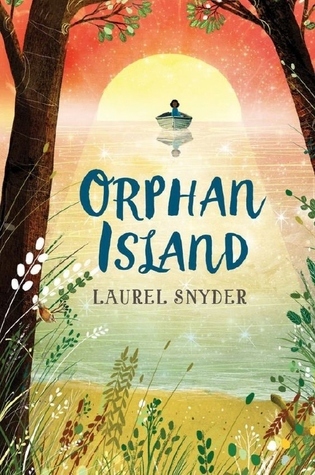"Nine on an island, orphans all / any more the sky might fall."
Sometimes you finish a book and you're not sure whether you've just read the best book of the year or witnessed a train wreck. It seems to happen more and more often to me. I feel like I should be getting more confident in my critical assessments as I get older, but instead I increasingly find myself going, "Huh! That sure was a book!" or, "Okay, I guess that's the kind of thing we're publishing these days?"
 Orphan Island is a hell of a thing. The premise is simple: nine children (each one year apart in age) live on an idyllic island. Once a year a boat comes to bring a new toddler (a Care) and takes away the oldest child (the Elder), who is approaching adolescence. It invites inevitable comparisons to Hokey Pokey, by Jerry Spinelli, of course, and for its first half Orphan Island seems to occupy that same allegorical space. We don't know how the children get there, or why, or how the island takes care of them. It just does. We do know that Jinny, the eldest child this year, is having a hard time letting go of childhood.
Orphan Island is a hell of a thing. The premise is simple: nine children (each one year apart in age) live on an idyllic island. Once a year a boat comes to bring a new toddler (a Care) and takes away the oldest child (the Elder), who is approaching adolescence. It invites inevitable comparisons to Hokey Pokey, by Jerry Spinelli, of course, and for its first half Orphan Island seems to occupy that same allegorical space. We don't know how the children get there, or why, or how the island takes care of them. It just does. We do know that Jinny, the eldest child this year, is having a hard time letting go of childhood.As an aside, Jinny is an admirably unlikable character. She feels like a real twelve-year-old. She's bratty and selfish and makes just about all of the mistakes it's possible to make on an island where nothing can go wrong.
Anyway, the book seems to be following a fairly predictable trajectory in which Jinny will grow and mature and generally get her shit together, and then she will leave the island and it will be bittersweet but necessary. But then the plot takes an unexpected turn. (Spoilers follow.)
After a pretty inauspicious year as Elder, the boat comes for Jinny, and she just... doesn't get in. She drags the thing up on the sand, collects the new Care, and determines to continue business as usual. Some of the other children warn her that she's breaking one of the very few rules that seem to hold their reality together, but Jinny doesn't care. Until reality starts to fall apart. The snakes are suddenly venomous. The winds that keep the children from falling off the cliffs are no longer functioning. The chickens stop laying. Children start getting hurt.
A lot of the reviews I've read have been frustrated with the ambiguous ending of Orphan Island. Jinny does end up leaving in the boat, along with the new Care (who is on the verge of death), but nothing is explained. Here are just a few of the things Snyder never tells us: How does the island work? Who created it, and why? Where do the children come from? Where do the children go? When Jinny leaves, will it fix the island, or is she leaving her fellow kids behind to starve? What are they supposed to do when all of the books in their little library fall apart (this one made me especially anxious)?
To those people, Laurel Snyder replies, basically: being twelve is weird and horrible and you have no idea what's happening to you or why. She wanted to replicate that experience in novel form. I'm... really not sure yet whether she has succeeded! I do know that she has created a world that is strange and vivid, populated with characters who feel like real children. I know that this is an ambitious book, and I have a feeling I will be thinking about it for a long time. It also features clear, strong, uncluttered prose - in that sense, I think it's Snyder's best work yet.
For those reasons, I would not be surprised if this one comes up for discussion at the Newbery table, but I wonder if it's too divisive to win. Either way, I plan to pass it along to my almost-twelve-year-old. Though she may refuse to read it, because she's bratty and contrary.
Published in May by Walden Pond Press.